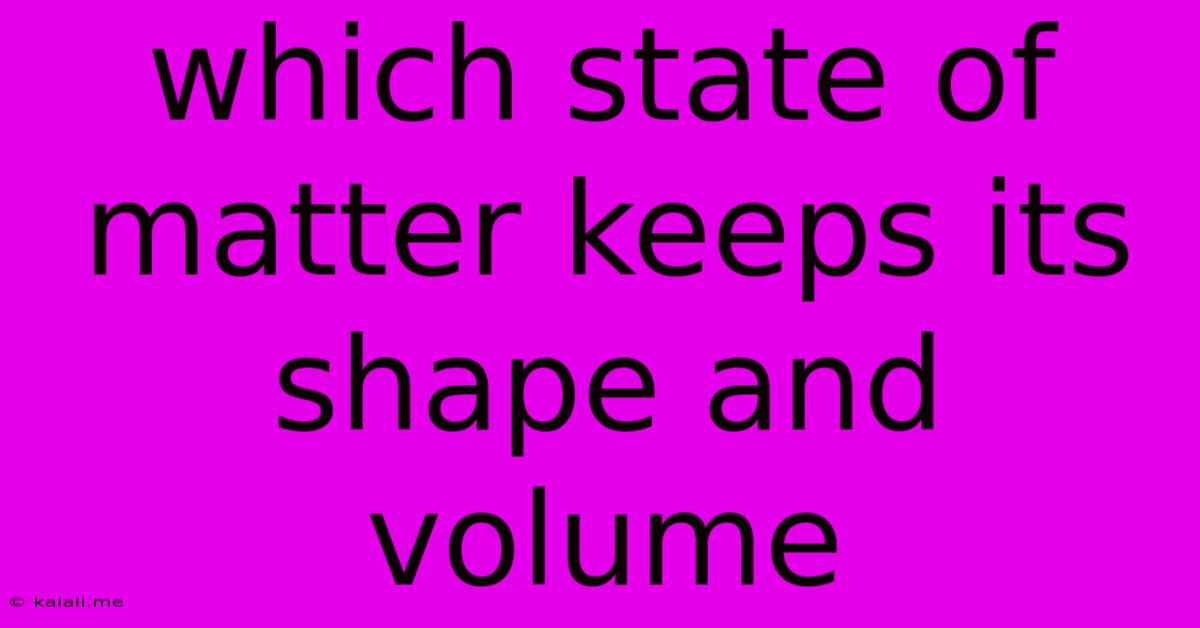Which State Of Matter Keeps Its Shape And Volume
Kalali
Jun 08, 2025 · 3 min read

Table of Contents
Which State of Matter Keeps Its Shape and Volume? Understanding Solids
The answer is simple: solids. Solids are one of the four fundamental states of matter (along with liquids, gases, and plasma), and they are uniquely defined by their ability to maintain a fixed shape and volume. This article will delve deeper into why this is the case, exploring the properties of solids and contrasting them with other states of matter.
This post will help you understand the fundamental differences between solids, liquids, and gases, focusing on their shape and volume. We'll explore the atomic structure and intermolecular forces that contribute to the unique characteristics of solids. Understanding this will greatly improve your scientific literacy and provide a solid foundation for further exploration in physics and chemistry.
The Defining Characteristics of Solids
The defining characteristic of a solid is its rigidity. Unlike liquids and gases, solids resist changes in both shape and volume. This is due to the strong intermolecular forces holding their constituent particles (atoms, ions, or molecules) tightly together in a fixed arrangement. These particles vibrate in place, but their overall position remains relatively constant.
- Fixed Shape: A solid retains its shape regardless of its container. A block of wood will remain a block of wood whether it's placed on a table or inside a box.
- Fixed Volume: Similarly, a solid maintains a constant volume. Compressing a solid requires significant force, and even then, the change in volume is usually minimal.
This fixed arrangement and strong intermolecular forces give solids their characteristic properties:
- High Density: Particles are tightly packed together, resulting in high density.
- Incompressibility: It's difficult to squeeze the particles closer together.
- Rigidity: Solids resist deformation.
Comparing Solids to Other States of Matter
Let's compare solids to liquids and gases to further highlight their unique properties:
- Liquids: Liquids have a fixed volume but take the shape of their container. The intermolecular forces are weaker than in solids, allowing particles to move more freely.
- Gases: Gases have neither a fixed shape nor a fixed volume. They expand to fill the available space, as the intermolecular forces are very weak, and particles move randomly with high kinetic energy.
The Microscopic View: Atomic Structure and Intermolecular Forces
At a microscopic level, the strong intermolecular forces in solids are responsible for the fixed arrangement of particles. These forces can be covalent bonds (sharing electrons), ionic bonds (electrostatic attraction), or metallic bonds (delocalized electrons). The specific type of bonding influences the properties of the solid. For example, diamond (covalent bonds) is incredibly hard, while table salt (ionic bonds) is brittle.
The arrangement of particles in a solid can also be highly ordered (crystalline solids like quartz) or less ordered (amorphous solids like glass). This difference in arrangement contributes to variations in properties.
Conclusion
In conclusion, the state of matter that keeps its shape and volume is the solid state. This property stems from the strong intermolecular forces holding its constituent particles in a fixed, closely packed arrangement. Understanding the differences between the states of matter is fundamental to comprehending the physical world around us. This knowledge is crucial across various scientific disciplines, including chemistry, physics, and materials science.
Latest Posts
Latest Posts
-
Stroy That Starts Of Light Then Gets Progressively Dark
Jun 08, 2025
-
Examples Of Gas Dissolved In Gas
Jun 08, 2025
-
Parents Keep The House Hotter Than Outside Summer
Jun 08, 2025
-
Air Conditioner Is Not Keeping Up
Jun 08, 2025
-
How To Adjust Spark Plug Gap
Jun 08, 2025
Related Post
Thank you for visiting our website which covers about Which State Of Matter Keeps Its Shape And Volume . We hope the information provided has been useful to you. Feel free to contact us if you have any questions or need further assistance. See you next time and don't miss to bookmark.